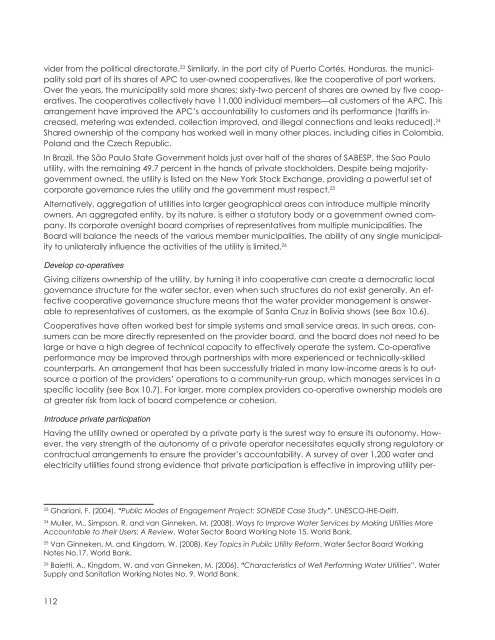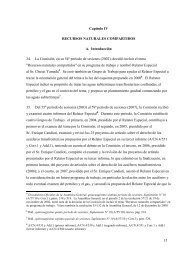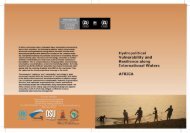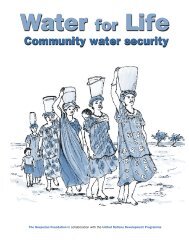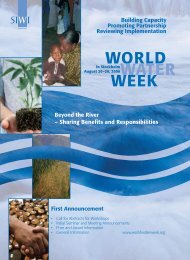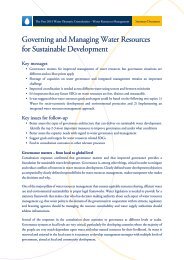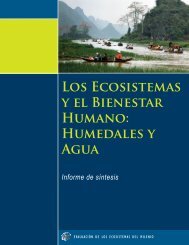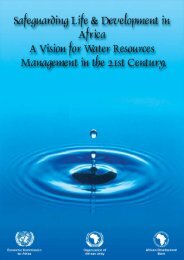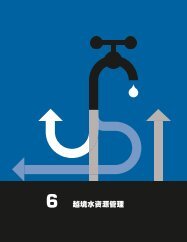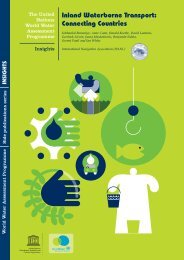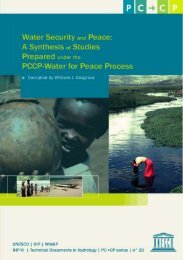A Sourcebook - UN-Water
A Sourcebook - UN-Water
A Sourcebook - UN-Water
Create successful ePaper yourself
Turn your PDF publications into a flip-book with our unique Google optimized e-Paper software.
vider from the political directorate. 23 Similarly, in the port city of Puerto Cortés, Honduras, the municipality<br />
sold part of its shares of APC to user-owned cooperatives, like the cooperative of port workers.<br />
Over the years, the municipality sold more shares; sixty-two percent of shares are owned by five cooperatives.<br />
The cooperatives collectively have 11,000 individual members—all customers of the APC. This<br />
arrangement have improved the APC’s accountability to customers and its performance (tariffs increased,<br />
metering was extended, collection improved, and illegal connections and leaks reduced). 24<br />
Shared ownership of the company has worked well in many other places, including cities in Colombia,<br />
Poland and the Czech Republic.<br />
In Brazil, the São Paulo State Government holds just over half of the shares of SABESP, the Sao Paulo<br />
utility, with the remaining 49.7 percent in the hands of private stockholders. Despite being majoritygovernment<br />
owned, the utility is listed on the New York Stock Exchange, providing a powerful set of<br />
corporate governance rules the utility and the government must respect. 25<br />
Alternatively, aggregation of utilities into larger geographical areas can introduce multiple minority<br />
owners. An aggregated entity, by its nature, is either a statutory body or a government owned company.<br />
Its corporate oversight board comprises of representatives from multiple municipalities. The<br />
Board will balance the needs of the various member municipalities. The ability of any single municipality<br />
to unilaterally influence the activities of the utility is limited. 26<br />
Develop co-operatives<br />
Giving citizens ownership of the utility, by turning it into cooperative can create a democratic local<br />
governance structure for the water sector, even when such structures do not exist generally. An effective<br />
cooperative governance structure means that the water provider management is answerable<br />
to representatives of customers, as the example of Santa Cruz in Bolivia shows (see Box 10.6).<br />
Cooperatives have often worked best for simple systems and small service areas. In such areas, consumers<br />
can be more directly represented on the provider board, and the board does not need to be<br />
large or have a high degree of technical capacity to effectively operate the system. Co-operative<br />
performance may be improved through partnerships with more experienced or technically-skilled<br />
counterparts. An arrangement that has been successfully trialed in many low-income areas is to outsource<br />
a portion of the providers’ operations to a community-run group, which manages services in a<br />
specific locality (see Box 10.7). For larger, more complex providers co-operative ownership models are<br />
at greater risk from lack of board competence or cohesion.<br />
Introduce private participation<br />
Having the utility owned or operated by a private party is the surest way to ensure its autonomy. However,<br />
the very strength of the autonomy of a private operator necessitates equally strong regulatory or<br />
contractual arrangements to ensure the provider’s accountability. A survey of over 1,200 water and<br />
electricity utilities found strong evidence that private participation is effective in improving utility per-<br />
23<br />
Ghariani, F. (2004). “Public Modes of Engagement Project: SONEDE Case Study”. <strong>UN</strong>ESCO-IHE-Delft.<br />
24<br />
Muller, M., Simpson, R. and van Ginneken, M. (2008). Ways to Improve <strong>Water</strong> Services by Making Utilities More<br />
Accountable to their Users: A Review. <strong>Water</strong> Sector Board Working Note 15. World Bank.<br />
25<br />
Van Ginneken, M. and Kingdom, W. (2008). Key Topics in Public Utility Reform. <strong>Water</strong> Sector Board Working<br />
Notes No.17. World Bank.<br />
26<br />
Baietti, A., Kingdom, W. and van Ginneken, M. (2006). “Characteristics of Well Performing <strong>Water</strong> Utilities”. <strong>Water</strong><br />
Supply and Sanitation Working Notes No. 9. World Bank.<br />
112


